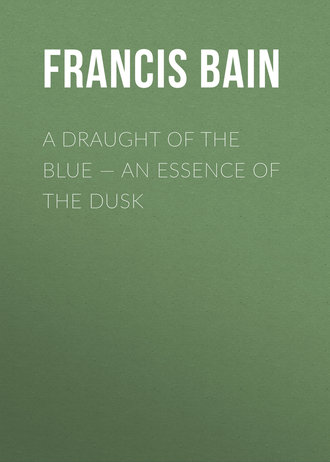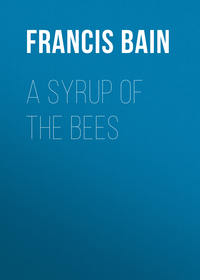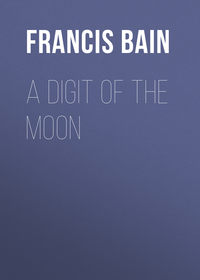 полная версия
полная версияA Draught of the Blue – An Essence of the Dusk
Then said Aja fiercely, in wrath both with himself and her: It is false, and she is true. But Natabhrúkutí answered very gently: Be not angry, for I do not question that she loves thee. I do not even doubt it: for if she did not, she would be a fool. But listen, and learn, what thou dost not seem to know, that Love is a Master Knave; aye! by far the greatest master of deceit in the three great worlds. And woman is his aptest pupil, and every woman living, were she even as simple as thyself, becomes, as soon as she falls under the influence of Love, a very incarnation of policy and craft and wiles. I tell thee, foolish boy, that she that loves in earnest, were she good as gold, pure as snow, and flawless as a diamond, would plunge, to gain her object, to the very lowest bottom of the ocean of deceit. And what is her object but the esteem of her lover? Dost thou think she would balance for an instant, between her lover and the ruin of the world? between his good opinion, and a lie? Dost thou think she would forfeit thy esteem, when to deceive thee would preserve it? I tell thee, in such a dilemma, she would lie, till the very sun at noon hid his face out of shame. Know,79 that long ago there lived at Wáránasi80 an independent lady, of beauty so extraordinary, that swarms of lovers used to buzz continually about her like great black bees about the mango blossom in the spring. But independent though she was, she was so fastidious, that none of her innumerable lovers ever touched her heart even for a moment. And hence she lived like a lamp at midnight surrounded by the corpses of her victims, who fluttered about her lustre and perished in its flame. And then at last, one day it came about that a tall young Rajpoot almost as beautiful as thou art arrived at Wáránasí. And Kasháyiní81 (for that was her name) saw him from a window as he came into the city; and instantly like an empty pitcher suddenly plunged into the Ganges, she was filled to the very brim by the inrush of Love's sacred nectar. And she said to herself: The very first thing that he will hear of in the city is myself. And like everybody else, he will come immediately to see me: and that very moment, I shall abandon the body out of shame. For though my beauty might attract him, yet he will be convinced that many lovers have preceded him, and therefore, at the bottom of his heart he will despise me. And this would be worse than any death. And yet without him, my birth will have been in vain. Therefore, I must devise some expedient. So after a while, she went out in disguise, and bought for a large sum of money the body of a woman of her own age and size who had died that very day. And bringing that body home secretly at night, she dressed it in her own clothes, and burned it till its identity was obliterated. And then she set fire to her house, and left it by a back door, and went away, abandoning all her wealth but the jewels that she wore, for the sake of her picture in the air.82 And at that very moment, the Rajpoot came along, led by some of the townspeople to visit her, as it were set on fire by the very description of her beauty. And he looked and saw the flames bursting from her house, as though lit by himself. And they found the half burned body in the ashes, and immediately all the lovers of Kasháyiní followed her through the fire of grief to the other world. But the Rajpoot managed, in spite of disappointment, to remain alive. And she, in the meantime, having given every one the slip, found a false ascetic, and bribed him with jewels, giving him instructions without letting him know who she was. So that ascetic went and struck up acquaintance with the Rajpoot, pretending to be a discoverer of treasure.83 And he performed incantations, and, after a while, he said to him: Go quickly to Ujjayini, and dig in the north-east corner of the burning ground outside the city on the very last day of the dark half of the month of Magha, and thou shalt find a treasure. Take it, for what is the use of treasure to such a one as me. Thereupon that Rajpoot, having nothing else to do, went. And Kasháyiní, having first made sure that the bait had taken, went herself and got there before him. So when that Rajpoot arrived, he dug exactly as he was told, and found absolutely nothing. And cursing his destiny, he went out of the burning ground in the early morning: and as he went along, suddenly he saw Kasháyiní, who was waiting for him, sitting weeping by the wayside, under a great ashwattha tree: beautifully dressed, blazing with jewels, and adorned with saffron and antimony, betel, indigo, and spangles, flowers, minium, and henna, bangles on ankle and comb in her hair. And she said to that Rajpoot, who was as utterly astounded by the sight of her as if she had been water in the desert: O son of a king, succour one who is utterly without resource. And when he asked her, what was the matter, she said: I was the only wife of a very rich merchant, and as we travelled from the South, suddenly we were set upon by a band of Thags. And after killing every one but me,84 they all went to sleep, thinking me secure; but in the middle of the night, I went a little way, and hid myself in a hollow tree. And in the morning those villains, after hunting for me in vain, all went away, fearing a pursuit, and I came out of the tree trembling, and reached this road, and now I am alone in the world. Then said the Rajpoot to himself: Ha! so, after all, I have found my treasure, and that excellent ascetic was a true prophet. And he said: O lady, I am of good family. And now, if thou wilt have me for a husband, I will supply the loss of thy merchant, and all the rest of thy relations. And she feigned reluctance: but after a while, she dried her tears, and consented. But that Rajpoot almost went out of his mind, so great was his delight. And one day he told her of Wáránasí, and the burning of Kasháyiní. And she looked at him with laughing eyes, and said: O my husband, I will make up to thee for the loss of Kasháyiní: for I am just as beautiful as she.
XAnd as Natabhrúkutí ended, she leaned forward, and gazed at Aja with soft seductive eyes, till he blushed, and wavered before her like the flame of a candle in a wind. For her beauty bewildered him, and her cunning story planted, as if against his will, the seed of suspicion in his mind. And in spite of himself, he said to himself: What if it were as she says, and my wife, like another Kasháyiní, were concealing from me something that she shrank from avowing, lest I should think the worse of her. And he turned pale at the thought, that any other lover should, even a very little, have occupied her heart before him. And he stood silent, and confused, striving to expel from his mind the doubt that Natabhrúkutí had raised in it, saying to himself: Can I really be only the last of many lovers? And all the while Natabhrúkutí watched him, devouring him as it were with her eyes. And at last, she said again: Sweet boy, thou art too young and too honest to cope with women, who were framed by the Creator to deceive. But Aja said angrily: Thou art thyself a woman, seeking at this very moment to deceive me: and as for thy age, it is less than my own. And she said: Nay, nay: I am older, for I am wiser than thyself. For when I see my husband, I remember him, but me thou hast utterly forgotten, thy true and only wife. Ah! foolish one, thou hast forgotten. And thou resemblest one, who casts away a costly jewel, for the sake of a bit of glass, shining only in the sunlight of thy ignorance, and trodden by the foot of every passing stranger. What! can I do nothing to rouse thy recollection? Look at me well! look hard, and it may be, something of me will touch as it were a chord in thy soul.
And she came up close to him, so that the warmth and fragrance of her beauty enveloped him like an atmosphere of intoxication. And she joined her hands, looking up into his face, as it were compelling his reluctant admiration by her humble submission to his will. And she said: Hast thou, hast thou indeed forgotten all? And as he gazed at her, two huge drops of crystal welled into her eyes, and hung poised before they fell on the net of her long dark lashes. And she said: Thou sayest, I am seeking to deceive thee. I love thee, and where is the deception? Is it not rather thou that art the deceiver in this matter? Is it any fault of mine if another has stepped in to defraud me of thyself? Or am I to be blamed, if thy beauty still beguiles me as it did long ago? And yet, dost thou accuse me as if I were a criminal? O blue black bee, what is this behaviour, that thou seekest as it were to pick a quarrel with the poor red lotus who loves thee but too well? And she smiled through her tears, and exclaimed: Ah! but in spite of thee, I will adore thee, whether thou wilt or no. Ha! and I will compel thee to remember, and force my way through every barrier and obstacle till I reach the recollection85 in the bottom of thy heart. O canst thou not remember the days of long ago, when my now despised beauty was a joy to thee, and my hair a very net to snare thy willing soul, and my eyes were more to thee than any diamonds, and these two arms were thy prison and thy chain, and this agitated bosom was thy pillow on which I lulled thee to slumber with the music of this very voice? Hast thou really forgotten the nectar of my kiss? hast thou actually forgotten thy own insatiable thirst? Ah! but if thou hast forgotten, I have not: and the innumerable multitudes of thy too delicious kisses come back to me, singing in my memory, and whispering in my soul like the lisping of the sea. Hark! Dost thou not hear them also, those voices of a former birth?
XIAnd as Aja gazed at her, stunned and almost overcome by the pathos of her irresistible appeal, and as it were swept from his feet by the surge of her passion, suddenly she seized his left hand with her right, and stood, grasping it as if convulsively, with the other hand raised, and bending her head, as if to listen. And he listened, and lo! there sounded in his ears a murmur resembling that of the sea, mixed with faint strains of music, and echoes of indistinguishable singing voices coming as it were from the ends of the earth. And a shudder ran through him, as she turned, and looked at him as if in ecstasy, with eyes that saw nothing, murmuring in an eager voice that chanted and charmed his ear like the rushing of a stream: Dost thou hear the voices, calling thee over to the other shore? For the sea is the sea of separation, and the other shore is our former birth. Far away over the setting sun hides the red land86 of our old sweet love. And I can take thee back to it, out of this dim and dingy wood. Only I can carry thee back to the land beyond the sunset hill, where love is lying dead. Over the sea where monsters lurk, and great pearls grow in sunless deeps, I can carry thee back again to the land of long ago. Never a ship with a silken sail could rock thee over across the waves so well as I will waft thee there on the swell of this soft breast. Never a breeze from the sandal hill could ferry thee over a silent sea so gently as will I, by breathing into thy raptured ear tales of thy old forgotten past with fond and fragrant lips. What! art thou still oblivious of that old delicious birth? Dost thou never behold in dreams the paradise of our little hut, and slake again thy raging thirst in a long forbidden kiss? Does she never come back to thee, the Brahmani girl with a face like mine, with lips that laughed and eyes that shone, and a mango flower in her hair? Say, dost thou never dream of her? And she shook his arm with frenzy, and exclaimed: Ha! wake from thy magic sleep, and tear away the curtain that hides me from thy blinded soul. I will, I will awake thee. I will not be forgotten. And all at once, she burst into a passion of tears. And she reeled, as though about to fall, and tottered, and threw herself, sobbing hard, against his breast.
And while she spoke, Aja stood, like one pushed to the very edge of a precipice, pale as death, and breathing hard, spellbound. And then at last, when she threw herself upon his breast, again a shudder ran through all his limbs. And as if her touch had shattered to pieces the last fragment of his resolution, he caught her around the waist with the one arm that was free. And with tears in his own eyes, he stammered, as if in the extremity of desperation, hardly knowing what he said: Alas! I have been harsh to thee. O lovely browed beauty, cease to weep. Why, O why, did I not meet thee sooner by only a single day?
XIIAnd at that very moment, he heard behind him a deep sigh. And as he turned, wood, poppies, and all vanished from before his eyes. Once more he stood on the city wall; and there before him was the King's daughter. And she was standing in the doorway through which he had come upon the wall, leaning against the open door, and paler than Love's own ashes, while her great dark eyes were frozen as it were to ice, and yet lit up by the triple fire of sorrow and reproach and fierce disdain. And she looked like the daughter of Janaka, when forsaken by the lord of the race of Raghu, and like the heavenly Urwashi, when abandoned by Pururawas, a very spirit of despair carved by the Creator into a stony female form, to break the heart of the three worlds. And as if the very sight of her had broken the spell that held him, reason and recollection suddenly returned to Aja, as it were at a single bound. And he woke, as if from a magic sleep, and on the instant, a sword ran as it were straight into his heart. And with a cry, he flung away his sobbing burden like a blade of grass, not caring where it fell: and ran towards the King's daughter. But she, when she saw him coming, shrieked, and started, and exclaimed: Away! Touch me not, save with the point of thy sharp true sword, to pierce me through the body as thy perfidy has my soul.
Then Aja tossed away his sword, with a shudder, over the edge of the wall. And he seized himself by the head with both hands, with a groan like the roar of a wounded lion. And he exclaimed: Ha! Better now it had been indeed, had I never emerged from the waste of sand. And he turned fiercely upon Natabhrúkutí, saying: This is thy doing, thou vile enchantress: and now I am indeed awake.
But even as he spoke, the words died away upon his lips; and he stood still, like a picture on a wall, for wonder at what he saw before him. For Natabhrúkutí was standing still, exactly where he left her, bolt upright, like a spear fixed in the earth. And her beauty was greater than ever, and yet such, that as he saw it, his heart stopped in his breast. For every vestige of the nectar of her love-emotion had left her, and in its place, the poison of immortal hate shone in her cold and evil eyes, which were fastened, as if with a mixture of pain and pleasure, with a glittering and fiendish stare, upon the King's daughter. And as he watched them, cold ran in Aja's veins. For her eyes shook, and changed colour, and a horrible smile played on her blue and twitching lips. And she looked thin, for her two arms hung down tight against her sides, and her fingers opened and shut, slowly, as if of their own accord.
And after a while, she spoke. And she turned to Aja, and said, in a voice that resembled a hiss: Fool! thou wouldst not take the blue flower I offered thee, though its fragrance could not have been matched by anything in the three worlds. Now, then, I will take another way. So as he watched her, she was gone: and he saw before him nothing but the empty city wall.
And as he looked again, not crediting the testimony of his own eyes, he heard a sharp cry from the King's daughter. And he turned, and saw Yashowatí sinking to the ground. And at that very moment Natabhrúkutí stood again before him. And she looked at him with strange eyes, and said slowly: Go now, and enjoy thy wife. But I must give thee just one kiss, before I go.
And as Aja looked into her eyes, suddenly, like a flash of lightning, he understood. And he struck his hand upon his brow, exclaiming: Ha! Now, now, I understand, too late. Thou art that very she, that was jealous of the King's daughter's beauty, and ruined her out of spite. And I have been befooled by thee, and failed to stand the test. And he ground his teeth with rage, that swept through him like a storm. And he said to himself: Alas! I threw away my sword. No matter. Now, then, as she said herself, I will take another way. And he looked at her, as she stood waiting. And he held out his arms, saying: Come, then. And as she put her face close to his own, he caught her by her slender throat, with both hands, in a grip like that of death.
And then lo! she was gone again. But in her place, he held in his grasp a huge yellow snake, which struck him, as he clutched it hard, once and twice, upon the lips.
A Fatal Kiss
And then, little by little, the night gradually came to an end. And the sun rose up, out of his home in the eastern mountain, and began rapidly to climb into the sky.
And all at once, there arose a great hubbub, and an outcry in the King's palace. And the women ran hither and thither, wailing and screaming and crying out: Haha! haha! the daughter of the King is gone. And they hunted in all directions, but could not find her anywhere: and they went and told the King. But he, when he heard it, came running just as he was in his night clothes, and hurried about with all the women, looking into every corner, and finding nothing. So after turning the palace upside down, he stopped short. And he said: What if she should have followed her lover up on to the city wall, and shared his fate! For beyond a doubt, like all his predecessors, he has vanished never to return.
Then they all went up the winding stair, the King going first. And he stepped out on to the wall. And instantly, with a piercing cry, he fell to the ground in a mortal swoon.
Then terror seized on all those women, and they stood exactly where they were, looking at each other with pale faces, not daring to advance. But at last, after a long while, supporting each the other, they pushed forward and looked out. And they saw the King's body, lying on that of his daughter; and a little further off, Aja, lying upon his face.
Then they went out, and took up those three bodies, and carried them in, and examined them. And after a while, they said: Doubtless the heart of the old King broke, when he saw his daughter lying dead. But as for the other two, one snake has evidently bitten both. And yet, this is a wonderful thing. For she has been bitten on the foot, but her lover upon the lips. What then? Was he trying to kiss the snake, that it should bite him upon the lips? For how could even the biggest snake reach up so high, as this great Rajpoot's mouth?
1
In but a part of the last night, there fell eight inches and a half of rain! Time for time, Mahabaleshwar can probably laugh at Cherrapunji. The valleys are scooped out as if with a trowel.
2
This mongoose was, no doubt, wondering "what the devil I did there": for during the rains he and his fellows have the hillsides entirely to themselves.
3
The hair of Shiwa, who caught the Ganges as it fell from heaven upon his head. It took the river a thousand years to find its way out.
4
[Greek: Theus anaitíos, aitía d' heloménou.]
5
I must ask the reader to excuse me for using a Scottish expression, for there is no English equivalent. It means to work out the fate that is laid upon him by what has been done in a previous existence.
6
The English reader should know, not only that the Great God's hair is red or tawny, but that he has in his nature a strain of wildness, something on the border-land of insanity.
7
The hair, or the abode, of Shiwa.
8
Nandi, whose hair is white.
9
Because, as Lucian said, without an heir to perform the due ceremonies, the unfortunate shades would have to go hungry and thirsty.
10
Shiwa and Párwatí combined.
11
Kshira nira, milk-and-water, is a technical term in Hindoo erotics for a very close embrace. The swan is credited by Hindoo poets with the power of separating the two: a curious idea, of which it is not easy to see the origin.
12
The moon, according to some philosophers, is the home of those pure spirits, who have purged themselves in former births sufficiently to deserve a certain grade of beatitude or bliss.
13
I.e. he had no turban on. In the East, on entering a house the head remains covered; it is the shoes which are removed.
14
Three things are essentially associated in Sanskrit poetry with the moon – icy cold, camphor, and the medicinal virtue of drugs.
15
Falling meteors, says the Brihat Sanhita, are the fruits of virtue enjoyed in heaven dropping in visible form.
16
Orion.
17
The Great Bear.
18
Wishnu, who in his third incarnation became a boar to support the earth: jaya jagadisha hare!
19
The Hindoo Aphrodite.
20
The Kámalátá is commonly described as red: this was perhaps some kind of Ipomæa, allied to the great white moon-flower of Ceylon.
21
An "old shikarri" told me, that he saw on one occasion a panther stalking a goat. As soon as they saw each other, they both stood stock-still, so long, that at last the goat concluded his panther was a mere illusion, and recommenced his dinner, browsing with unruffled mind. He would have paid dear for his simplicity, had not his crafty stalker been this time stalked himself.
22
These ancient forest hermits, who lived alone in jungle, doing penance and eating nothing, are one of the conventions of Hindoo fairy stories. Such a one, like the mediæval saint, a bundle of bones whose breath corrupts the world before his death, generally has a daughter, to whose rare beauty he forms the contrast: that sharp, fierce contrast, which is the essence of the East, like life and death.
23
Abalá, "weak," "without strength," is a common Sanskrit word for a woman, Vas infirmius.
24
Indra is represented as jealous of all ascetics, lest they should reach his total of a century of sacrifices (Shatahratu). But his battle with Raghu on this head ended in a compromise (vide Raghuwanshä, canto iii.).
25
Purusha and Prakriti answer, in a sense, to our Adam and Eve: as the Germans would say, the Ur-mensch and Ur-weib of the world.
26
Ascetics wear their hair twisted in a knot, in imitation of the prince of them all, Maheshwara.
27
When Ovid contrasted the os sublime of man with that of the animals, he gave expression to the idea that underlies the curious Sanskrit term for the brute-creation, the horizontal-goers (tiryag-játi).
28
There is a beautiful Indian idea, that the foot of a pretty woman will cause a particular tree (I cannot recollect which) to break into blossom.
29
"Kissed by the bees." (Note, that the third syllable rhymes, not with crumb, but with room, pronounced rather short.)
30
This single word, a common name in Sanskrit for the lotus, possesses an incomparable, moral and æsthetic, mingled beauty, which can only be poorly rendered in English by five words instead of one. Mud-born is the word: but the meaning it covers is the pure white lotus that springs out of the thick black mire: just as the brightest rainbow is seen against the darkest cloud.
31
No woman in India, even in a fairy tale, is ever independent and her own mistress, unless she belongs to a class outside the pale of moral consideration.





